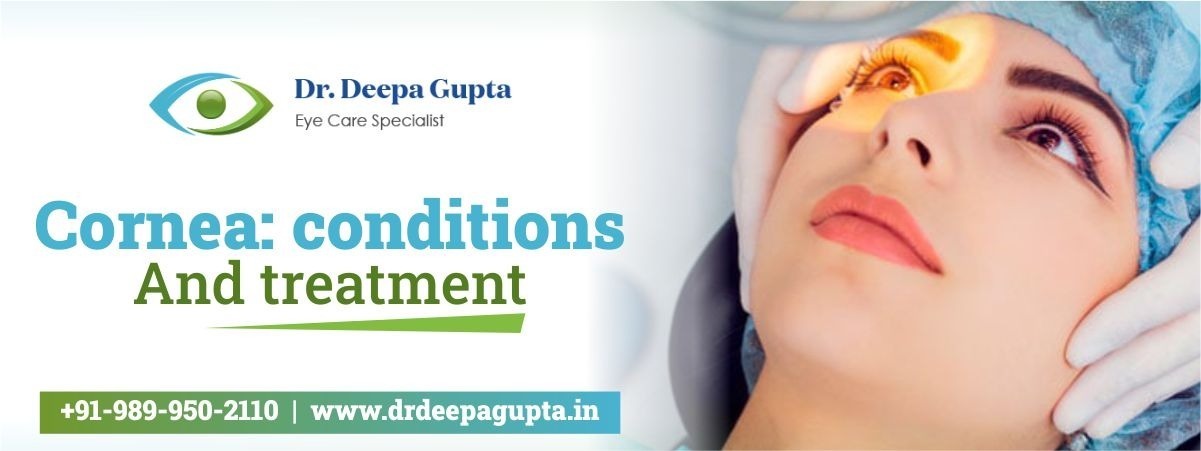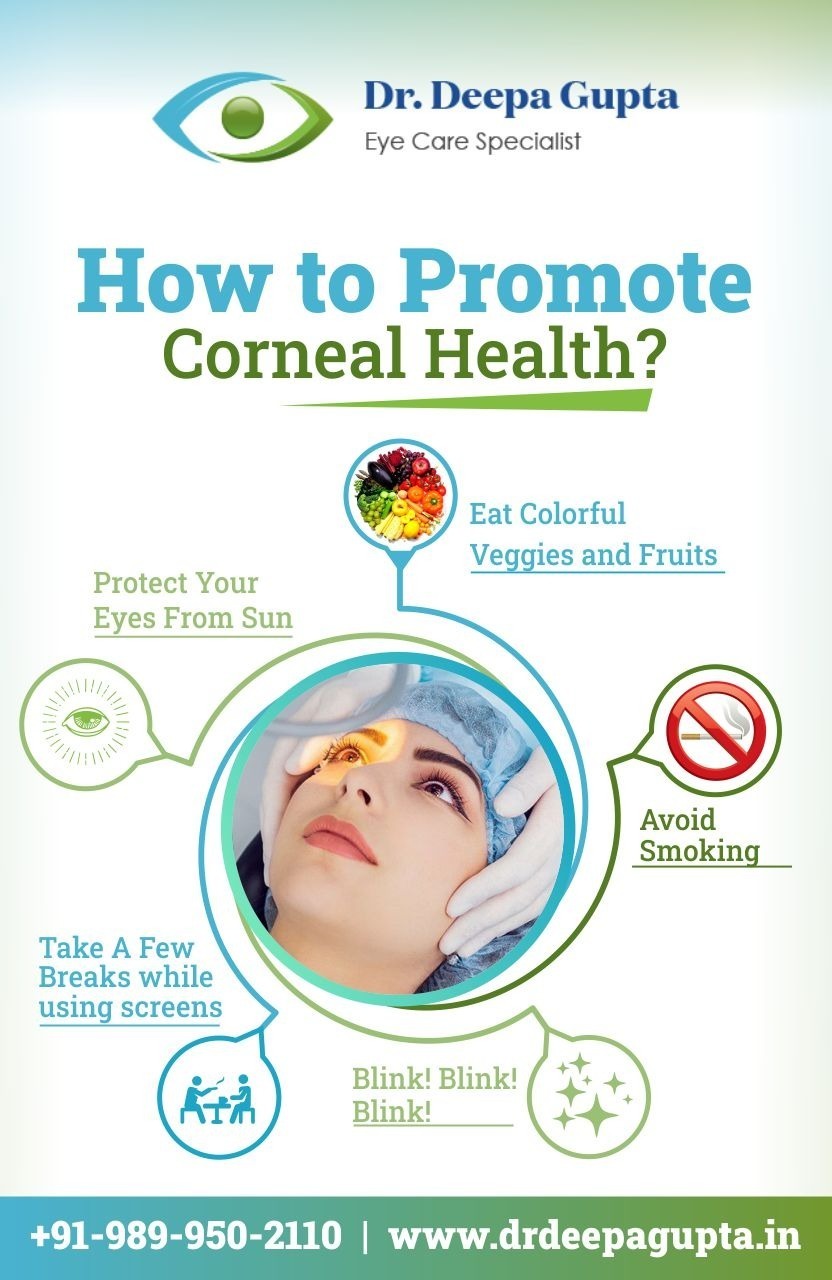
A person should have a healthy cornea (eyes) to have good vision. If the cornea or the eyes become infected or unhealthy in any form, one may face some challenges in vision. If it remains untreated for a prolonged time, it can lead to blindness. The symptoms of Corneal disease should not be ignored. One should consult an experienced eye specialist to determine which treatment options are appropriate for your cornea problem.
What is Cornea?
The cornea of the eye provides a protective shield from infections, foreign particles, and even from the sun’s harmful ultraviolet (UV) radiation. It functions as a clear, outer layer over your eye’s lens and iris, as well as performs the foremost preliminary step of visual processing. The light refraction mechanism begins at the curved edge of the cornea, which aids in both close and distant vision.
Cornea problems can seriously impair your vision. They’re prone to damage as they are exposed to the outer layer and the most sensitive part of the eyes. Any kind of injury, damage, or infection can cause impaired vision, whereas any kind of reduction in the transparency nature of the cornea can result in blurred vision.
Corneal diseases can be triggered by various factors like genetic, environmental or any injury or other damage. The symptoms of diagnosed medical conditions can vary from light sensitivity, blurred vision to severe pain and irritation in the eyes. An accurate and timely diagnosis helps to receive better corneal disease treatment.
Some common symptoms of corneal damage or injury are pain in the eyes, swelling, redness, tearing, blurred vision, sensitivity to light, etc. Some other symptoms to pay attention to are a distortion of visual image, corneal scarring, reduction in sharpness of an image.
Types of Corneal diseases: Signs and Symptoms
Ophthalmologists address the mild symptoms with the help of specific eye drops and deep analysis of the eyes during routine checkups. Some common corneal diseases are:
- Corneal Ulcer: It is an inflammatory disease caused within the cornea when germs and fungus infections get into the eye. It is also known as Keratitis. This occurs after an eye injury or a contact lens-related injury. Its symptoms are corneal discharge, redness associated with pain, and blurred vision. Corneal Ulcers can repair and heal themselves within 3-7 days of proper medications and care.
- Ocular herpes: It is caused by the herpes simplex virus (HSV I). Cold sores and genital herpes are both also caused by this same virus. Ocular herpes produces inflammation in the eye and sores on the eyelids. This disease is chronic, and if not treated properly, the person has a 50% chance of contracting it again.
- Corneal degeneration and dystrophy: It is a group of conditions that are hereditary and caused due to genetic factors. They cause structural changes or defects in the cornea. Keratoconus is a type of one such condition in which the cornea thins and reshapes. The condition causes the cornea to become uneven or cone-shaped, obstructing our vision. It can occur in either one or both of the eyes. It is a kind of refractive disorder that leads to nearsightedness and astigmatism. Swelling, corneal scarring, and night vision loss are all symptoms associated with this syndrome.
- Allergies: Allergies related to environmental factors like smoke, fog, pollution, and pollen grains are also other factors that affect the cornea, especially in dry and warm seasons. The symptoms associated with corneal allergies are irritation, burning sensation, itching, redness, tearing, and water discharge.
- Dry eyes: It is one of the most common conditions in which the eyes are not able to keep themselves sufficiently moist and lubricated, due to which lower amounts of tears are produced. This type of condition is also prone to surface infection. It also causes symptoms like burning sensation, stinging, episodes of excessive tearing followed by dryness, pain, and redness.
- Corneal injury: The cornea functions as a protective shield for the eyes. It can restore and recover itself from mild injury. But in case of a major injury, it needs proper time, medication and treatment to heal. Deeper injury can cause corneal scarring and impaired vision, which sometimes require a corneal transplant.tegorized as corneal diseases or corneal dysfunction, which necessitate a thorough approach to treatment. With the advancement in new technologies and the comprehensive approach of doctors, many prestigious eye care facilities provide treatment for serious corneal problems. For years, the doctors have treated corneal-related disorders and helped patients restore their vision. Based on your conditions and the severity of the disorder, the line of treatment is decided where your vision is not at risk.
Procedures involving basic treatment, appropriate usage of contact lenses, removal and replacement of damaged cornea, a crosslinking process involving UV radiations, and laser therapy are a few listed treatments suggested for corneal damage.
Treatment for Corneal Diseases
All the aforesaid eye conditions are broadly categorized as corneal diseases or corneal dysfunction, which necessitate a thorough approach to treatment. With the advancement in new technologies and the comprehensive approach of doctors, many prestigious eye care facilities provide treatment for serious corneal problems. For years, the doctors have treated corneal-related disorders and helped patients restore their vision. Based on your conditions and the severity of the disorder, the line of treatment is decided where your vision is not at risk.
Procedures involving basic treatment, appropriate usage of contact lenses, removal and replacement of damaged cornea, a crosslinking process involving UV radiations, and laser therapy are a few listed treatments suggested for corneal damage.
Takeaway:
Any type of irritation, swelling, redness, or any other trouble related to it should not be ignored. You should visit and consult an ophthalmologist, who has expertise in corneal treatment, to get a timely diagnosis and quick treatment.
Dr. Deepa Gupta is among one of the best cornea specialists in gurgaon, Delhi NCR, who holds expertise in corneal treatments. Backed with years of experience and highly professional skills, she has great command in performing various types of cataract surgeries. Her area of specialization lies in corneal transplants, especially lamellar corneal transplants like DALK and DSAEK.
Dr. Deepa is one of the finest ophthalmologists in Gurgaon who is highly knowledgeable, very patient, and well-experienced in diagnosing corneal illness based on a complete eye examination. At Dr. Deepa Gupta eye center, sophisticated eye care with specialized cutting-edge procedures and a highly skilled team of doctors strive for patients’ fastest and most complete recovery.
FAQs
- Can the cornea heal itself?
Minor damage to the cornea can be self-healed. But some major injury or damage needs medications and proper treatment to heal.
- Can a damaged cornea cause blindness?
Corneal injury, if left untreated, results in impaired or blurred vision, which is one of the prominent causes of blindness throughout the world.
- How can a damaged cornea be treated?
A damaged cornea can be treated by proper consultation with a doctor. Removal of foreign particles, treating infection from the eye, wearing proper eye contact lenses, using medicated eye drops or sometimes surgical methods, can help the recovery of the cornea.
- How can we diagnose a damaged cornea?
One can look for the symptoms like redness, irritation, burning sensation, swelling, tearing or blurred vision in one or both eyes. These symptoms should not be left unchecked and doctor consultation must be sought.
- How long does it take the cornea to recover?
The cornea recovery time varies from the severity of the disorder. If there is minor injury or damage to the cornea, one can get a quick recovery within 2–3 days. If the damage is major, it may take some time to heal.

